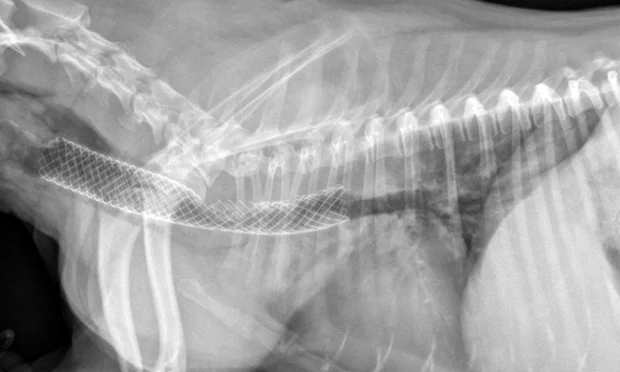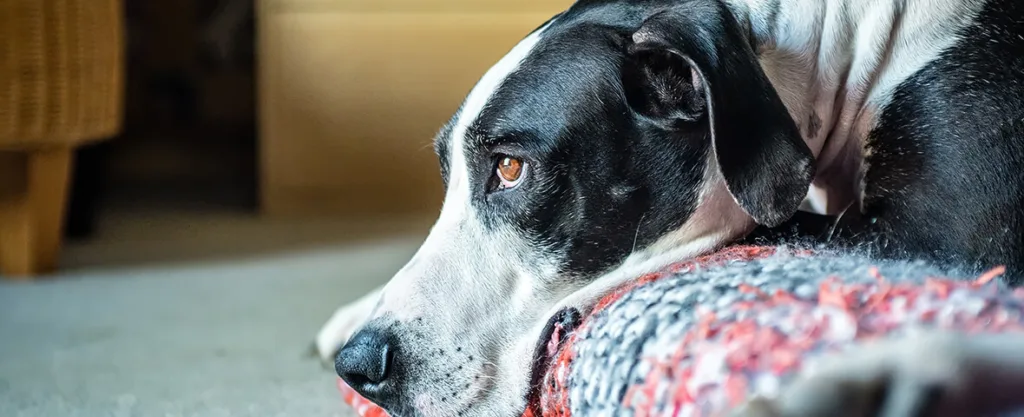Tracheal Collapse In Dogs or Canine bronchitis is a chronic disease of dogs that affects the airways. This condition can cause mild to severe obstruction in the dog’s airway, resulting in coughing and other symptoms.
Tracheal collapse can be fatal, so it is important to have them checked by a vet if your dog is suspected of showing signs of collapsed trachea.
Keep reading to find out what you need to know about collapsed bronchitis in dogs, how to identify and treat it.
What is a Tracheal Collapse In Dogs?

Also known as the lungs, the trachea is part of the respiratory system that carries air from the nose and mouth to the airways in the lungs.
It is made up of cartilage rings, which form a tube.
If the cartilaginous rings of the trachea weaken, they collapse and the airway becomes narrow, making it difficult to breathe.
Causes of Tracheal Collapse In Dogs
Tracheal problems in dogs are usually congenital, meaning the dog was born with weak cartilage in the airways.
Puppies or miniature breeds are commonly affected, but some breeds are more susceptible to this condition, including:
- Yorkshire Terriers
- Pomeranians
- Shih Tzus
- Toy Poodles
- Chihvavas
As the condition progresses, the symptoms usually worsen over time.
The average age at which dogs begin to show signs is 6 to 7 years.
Other risk factors for collapsed airways:
- Chronic respiratory diseases
- Cushing’s disease
- Heart disease
- Obesity
- Exposure to cigarette smoke
Symptoms of a collapsed trachea in dogs

The most common and widely known symptom of a collapsed trachea is a chronic cough, exacerbated by exercise, excitement, and eating or drinking. Other signs of bronchial collapse in dogs:
- Rapid breathing
- Abnormal breathing sounds
- Difficulty in breathing
- Low power
- Blue color for gums
- Fainting
- Obesity, exposure to dirt and smoke, and humid weather can exacerbate symptoms.
What does the dog do with the Collapsed Trachea sound like?
The sound of a dog coughing with a collapsed trachea is very different. It is most often described as a harsh, dry cough that feels like a honking goose.
How is the collapsed Trachea diagnosed?
The most obvious sign of a collapsed trachea is a hoarse cough, but your veterinarian will need to do a full physical exam and do some tests to rule out other conditions.
These tests are included:
- Chest X-rays
- Fluoroscopy (X-ray of the dog moving while breathing)
- Bronchoscopy (insertion of a tube into the airway with a camera)
Your veterinarian may also perform other tests, such as hemorrhage, to see if there are any co-morbid conditions that could worsen the symptoms.
Treatment of collapsed trachea in dogs
Very mild and moderate cases of bronchial collapse can be treated with medication. Your veterinarian will determine the best course of treatment based on your dog’s symptoms and medical history.
Medications for tracheal collapse
Bronchodilators
For dogs whose airways have collapsed, bronchodilators (such as theophylline, terbutaline, or albuterol) may be prescribed to open the airways in the lungs and allow more oxygen to enter the bloodstream.
Also Read: Best Pet Safe Bug sprays for home and Yards (2021 Review)
These pill medications can be prescribed in pill form or in inhaled form.
Inhaled bronchodilators are easy for an endangered pet to maintain and require the use of a spacer device (such as the aeroDawg * Chamber).
Relieving cough
Liquid cough suppressants such as butorphanol or hydrocodone are indicated to relieve cough irritation and inflammation of the airways.
Corticosteroids
Anti-inflammatory steroids such as prednisone or fluticasone may be prescribed to reduce inflammation in the airways.
These drugs can be taken orally or by inhalation, but inhaled steroids have a very low risk of serious side effects and can be used in significantly lower doses.
Similar to bronchodilators, inhaled corticosteroids require the use of a spacer device for drug administration.
Sedatives
When dogs are excited or bloated, their symptoms worsen. Butorphanol or acepromazine tablets may be prescribed to lightly anesthetize your dog to reduce the onset of symptoms.
These medications may not completely cure the condition but will help reduce the ongoing symptoms that will help your pet live without pain.
Surgical intervention for tracheal collapse
In severe cases of bronchial collapse, surgery may be required to keep the lungs open. In this surgery, the veterinary surgeon usually places plastic rings on the outside of the trachea. Another option is to place the stent to keep the airway open
Home Remedies for Tracheal Collapse in Dogs
Among other treatments, you can do a number of things at home to help manage your dog’s symptoms.
While walking along with your dog, use a harness to replace the collar to keep your dog from pressing on the air pipe
- Try to avoid smoking or using aerosol paints around your pet
- A very well ventilated sorroundings are preferred
- Replace air filters regularly
- If your dog is overweight or obese, adjust its diet based on your veterinarian’s recommendations to help control weight and reduce respiratory effort.
Although there are ways to help manage your dog’s symptoms at home, it is important to take your dog to a veterinarian so they can get the treatment they need.

